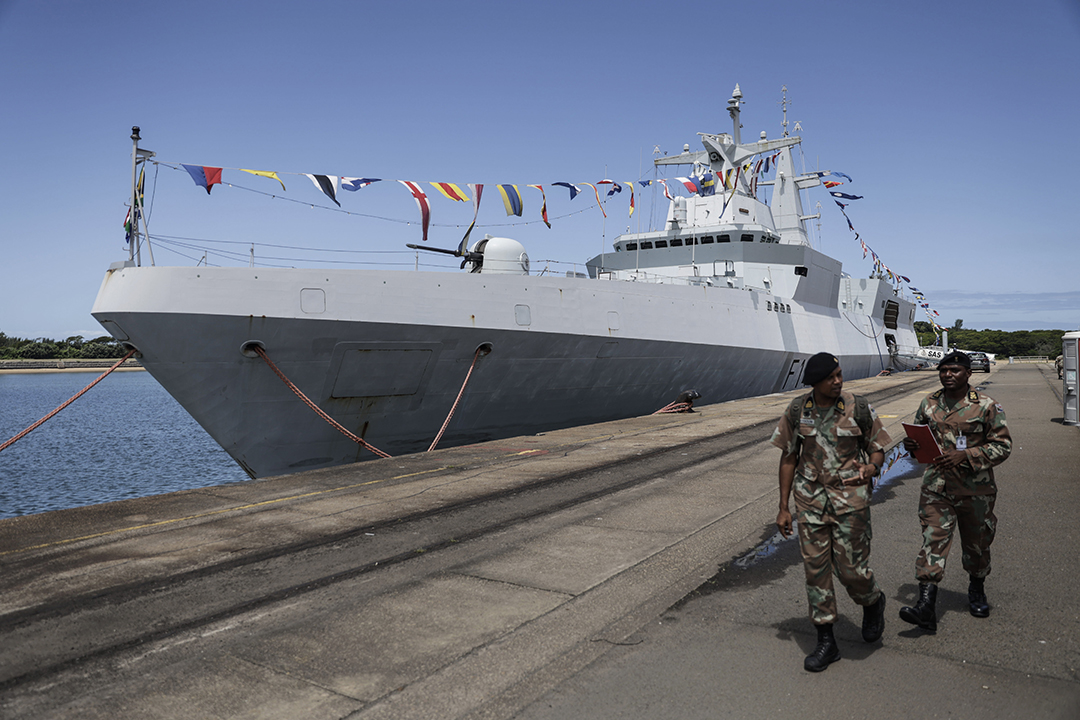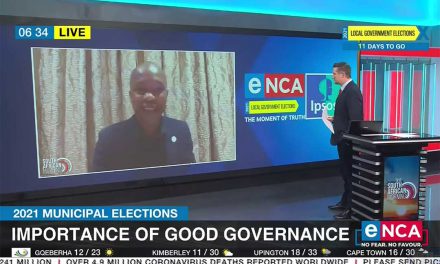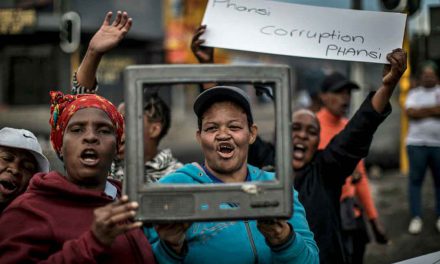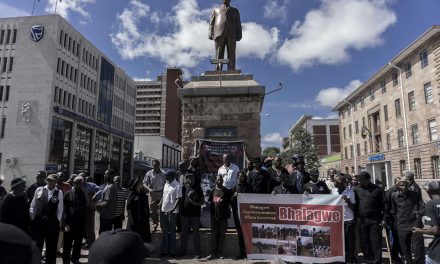Given that Russia has flagrantly violated Ukraine’s national sovereignty, we must ask whether South Africa’s foreign policy stance is grounded in unequivocal respect for sovereignty. South Africa has endured continued criticism for not acting decisively to oppose the Russian invasion of Ukraine. It also faces a dilemma over whether to allow Russian President Vladimir Putin into the country for a BRICS summit later this year, given that the International Criminal Court recently issued a warrant for his arrest.

South African National Defence Force (SANDF) soldiers walk past the South African military frigate “SAS Mendi” docked at the port in Richards Bay on February 22, 2023. South Africa embarked on a 10-day joint military exercise with Russia and China on February 17. Photo by Guillem SARTORIO/AFP
The criticism of South Africa’s position has been amplified by the most recent naval exercises between Russia, China and South Africa, ending in the last week of February 2023. Not only was South Africa a participant, but it hosted these drills off the KwaZulu-Natal coast. It was the second such exercise after a drill in November 2019.
Although this is not the first time these countries have engaged in naval exercises together, Exercise Mosi II included a participant which is actively involved in armed conflict. The drills took place shortly after South Africa received criticism for hosting Russian foreign minister Sergey Lavrov.
Aside from the distinct possibility of this decision straining Pretoria’s relationship with some of its strategic partners such as the US, and the market access it enjoys through the African Growth and Opportunity Act, the decision to take part in drills with a country involved in the conflict appears to represent a disregard for Pretoria’s official diplomacy of Ubuntu that is meant to animate the country’s foreign policy.
Citizens reasonably expect that the state will act in the nation’s best interests by implementing a consistent and coherent foreign policy. In the apparent absence of this, we should ask questions about the exact nature of South Africa’s national interest and our foreign policy.
Given that Russia flagrantly violated Ukraine’s national sovereignty, we must ask whether South Africa’s foreign policy stance is grounded in unequivocal respect for sovereignty. Moreover, understanding that South Africa’s post-1994 foreign policy ought to be directed by the pre-eminence of respect for human rights, we should ask whether our leaders have deviated from that position, and if so, why? What is the message that such participation sends in light of Pretoria’s insistence that its stance on the Russia-Ukraine conflict is simply one of neutrality or “non-alignment”?
South Africa’s national interest
In 2022, the Department of International Relations and Cooperation released Pretoria’s National Interest Framework Document which defines the country’s national interest as “the protection and promotion of its national sovereignty and constitutional order, the well-being, safety and prosperity of its citizens, and a better Africa and world”.
This definition is aligned with the White Paper on South African Participation in International Peace Missions (1999) and the White Paper on South African Foreign Policy (2011).
South Africa’s foreign policy appears to have deviated from the country’s foundational ideals and what was meant to guide its future foreign policy. The national interest definition detailed in the 2022 framework document is underpinned by Pretoria’s ideational values. These values place less emphasis on power politics and rather focus on democratic solidarity. As such, the document draws insight from Donald Nuechterlein’s seminal 1976 essay, which introduces foreign policy goals that go beyond possessional goals to milieu goals.
In foreign policy, milieu goals place less emphasis on acquiring possessional gain and more on the development of an inclusive and beneficial global order. In line with the milieu goals logic, the 2022 framework document states that “South Africa aspires for the world to also enjoy a society based on democratic values, social justice and fundamental human rights. South Africa will seek to uphold its values globally and promote a broad and inclusive international human rights system that includes civil and political, socioeconomic and cultural rights for all.”
The recently released Economist Intelligence Unit’s democracy index depicts a marked regression in Russia’s global position. While South Africa fell one spot from the previous year’s ranking to 45th in the globe in 2022, Russia dropped to 146th, marking the biggest decline (from 124th the year before). The biggest contributor to this was the Russia-Ukraine conflict which was accompanied by comprehensive censorship and persecution of any internal dissent in Russia.
South Africa’s non-alignment
There are at least two value factors at play in South Africa’s “non-alignment” posture on the Russia-Ukraine conflict that we should reflect on. These are Pretoria’s national prestige and the geopolitical effect of its current posture.
After 1994, the South African Defence Force (SADF) became the South African National Defence Force (SANDF), which would be used as an instrument of foreign policy. This also meant that operations would be guided by the principles and spirit of Ubuntu.
Ultimately, the SANDF had changed its mission to one of defence rather than destruction. This “transformation” had a positive impact on Pretoria’s national prestige – which is how the state is viewed by the public and international players.
Almost 30 years after the transformation of the SADF to the SANDF, one could wonder how South Africa’s recent participation in naval exercises with a country actively involved in conflict could benefit its national prestige.
This year marks South Africa’s chairmanship of Brazil, Russia, India, China and South Africa (BRICS) bloc, which is a significant forum of partners of the Global South. Some commentators have argued that South Africa’s position on the Russia-Ukraine conflict has an impact on its aspirations and influence within this bloc.
However, South Africa also has strategically important bilateral and multilateral relations with other countries beyond the BRICS bloc. The Russia-Ukraine conflict has had – and continues to have – a negative impact on South Africa’s bilateral relations with these key trading partners.
On 24 February 2023, Republican House Representative John James initiated Resolution HR145 in the US Congress. The resolution called for the US government to “conduct a thorough review of the US-South Africa relationship” considering the joint naval drills. The resolution opposes both South Africa’s participation in and hosting of the naval drills with China and Russia.
Detailing South Africa’s future foreign policy in 1993, Nelson Mandela stated that “because the world is a more dangerous place, the international community dare not relinquish its commitment to human rights… Human rights will be the light that guides our foreign affairs… The pillars upon which our foreign policy will rest are the following beliefs: that issues of human rights are central to international relations and an understanding that they extend beyond the political, embracing the economic, social and environmental.”
In 2023, South Africa’s participation in and hosting of the Russia-China naval exercises surely sends a worrying message that questions the basis on which Pretoria continues to maintain “neutrality”. South Africa’s foreign policy appears to have deviated from the country’s foundational ideals and what was meant to guide its future foreign policy.
To remain “neutral” when Russia violates human rights is a violation of South Africa’s national interests in every dimension of the values that are meant to animate it. Pretoria may want to consider the fact that condemning Russia’s behaviour does not equate to endorsing American aggression. It does not (and should not) suggest that South Africa agrees with America’s own history of invasion, meddling in other countries’ domestic affairs, and other forms of aggression.
Rather, it would be a principled condemnation based on South Africa’s foundational values which centre on human rights.
This article first appeared in the Daily Maverick on 6 April 2023.
Mxolisi Zondo is a Researcher in the Governance Delivery and Impact programme at Good Governance Africa. He holds a BA Honours in International Relations and a Bachelor of Political Science from the University of Pretoria (UP). He is currently pursuing his Master of Arts Degree in Diplomatic Studies at UP. His dissertation looks at the extent to which South Africa’s involvement in peace missions on the African continent serves the country’s national interest. Before joining Good Governance Africa, he worked as a Public Policy Intern at Frontline Africa Advisory. He has also worked as an Assistant Lecturer and Research Assistant at the University of Pretoria.







